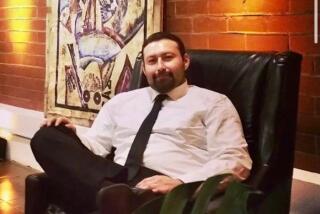Ex-Lawman Is Guilty in Death of Successor
- Share via
ALBANY, Ga. — A former Georgia sheriff was convicted Wednesday of ordering the assassination of his political nemesis, a reform-minded lawman gunned down on his own driveway three days before he was to take office.
Sidney Dorsey was found guilty of first-degree murder in the brazen slaying of Sheriff-elect Derwin Brown in suburban Atlanta in December 2000. From day one, Dorsey had been the prime suspect, although prosecutors struggled to build a case against him, saying he used his status and police know-how to thwart them.
As the verdicts were read, Brown’s widow, Phyllis, sobbed so hard she fell to the courtroom floor. As Dorsey was led away, her family collapsed around her.
“Derwin, Derwin, I can face you now,” she cried. “I can face you.”
Dorsey didn’t blink. He didn’t say anything.
It’s been a long slide down for Dorsey, 62, who had been celebrated as the first black sheriff of De Kalb County. He will be sentenced to life in prison for the murder because the prosecution did not seek the death penalty. He also was convicted of 11 corruption-related charges, including bribery, theft and violation of his oath. His attorneys have vowed to appeal.
“I feel horrible,” defense lawyer Brian Steel said. “An innocent man is going to jail.”
Prosecutors ultimately turned to a man they believed had conspired with Dorsey, offering immunity in exchange for his dramatic testimony. In the end, though, at least one juror said that witness didn’t matter as much as their belief that Dorsey had a strong motive to kill Brown.
The monthlong trial had all the classic themes of greed, hubris, betrayal and temptation. It was a tale, the way prosecutors told it, of absolute power corrupting absolutely.
Dorsey started out as a poor kid in New York, taking a train to Georgia by himself. He cleaned toilets for school fees, joined the Army, put himself through college and law school while working as a cop and then, in middle age, found himself at the peak of the area’s law enforcement pyramid.
Along the way, he killed two men--one in the line of duty in 1965, another during a fistfight at a gas station in 1970.
Both times, he was cleared of any wrongdoing, though prosecutors in the Brown case suggested afterward that those two killings emboldened him.
“He had gotten so arrogant,” lead prosecutor J. Tom Morgan said. “He actually thought he could get away with killing Derwin even though he knew he would be the prime suspect.”
As sheriff of De Kalb County, he was in charge of a 3,700-bed jail, a $50-million budget and 750 employees.
Prosecutors said Dorsey ran the department like an extension of his ego: making deputies run personal errands and work for his private security business, forcing women to have sex with him, demanding bribes.
In the summer of 2000, Brown challenged Dorsey with a simple pledge: I won’t be sleazy.
Brown, 46, and also black, was playing off the fact that every De Kalb County sheriff since 1964 had been investigated, indicted or imprisoned. That included Dorsey, who was under investigation concerning the theft of jail resources.
Brown trounced Dorsey in a runoff election. He was set to take the role of sheriff when he pulled up to his house Dec. 15, 2000, and stepped out with an armload of Christmas presents and roses for his wife. That’s when someone popped out of the bushes and shot him 12 times.
For months, authorities didn’t have anything to go on, save a handful of 9-millimeter shells. Morgan, a third-term district attorney, was criticized for a lackluster investigation.
But the big break came in November, when authorities convinced two men that they suspected were involved with the murder to testify against Dorsey. They granted them immunity. The lead witness would be Patrick Cuffy, a former protege of Dorsey who helped plan the killing.
The immunity gamble initially didn’t pay off. Authorities believe that Dorsey hired four men to kill Brown and in March, two other suspects, including alleged triggerman Melvin Walker, were sent to trial. Both were acquitted. Jurors said they thought Cuffy was lying.
This time, Cuffy was more polished. Without missing a beat, he told a story of Dorsey handing him a note that said, “Kill Derwin Brown.” Dorsey wanted Brown out of the way so he could run again for sheriff, Cuffy said.
“My mission was to follow through with what Mr. Dorsey asked,” Cuffy said, “and that was to kill Derwin Brown.”
But at least one juror said it wasn’t Cuffy’s testimony that swayed the panel.
After the judge thanked them, the lone man among a panel of women ambled out of the jury box and into the arms of Brown’s mother.
“Just want to tell y’all I’m sorry,” juror Willie Hayes said as he hugged her.
While Brown’s family listened raptly, Hayes, a 64-year-old probation officer, explained what happened during the two days of deliberations. He said a lot of people didn’t believe Cuffy. He said the jurors were troubled by the immunity deals.
But in the end, the case was about power--and what one man would do to keep it.
“Dorsey played God,” Hayes said. “And you can’t play God.”
“Amen,” said Brown’s mother, Burvena, wringing Hayes’ hand like a handkerchief. “Amen.”
More to Read
Sign up for Essential California
The most important California stories and recommendations in your inbox every morning.
You may occasionally receive promotional content from the Los Angeles Times.













